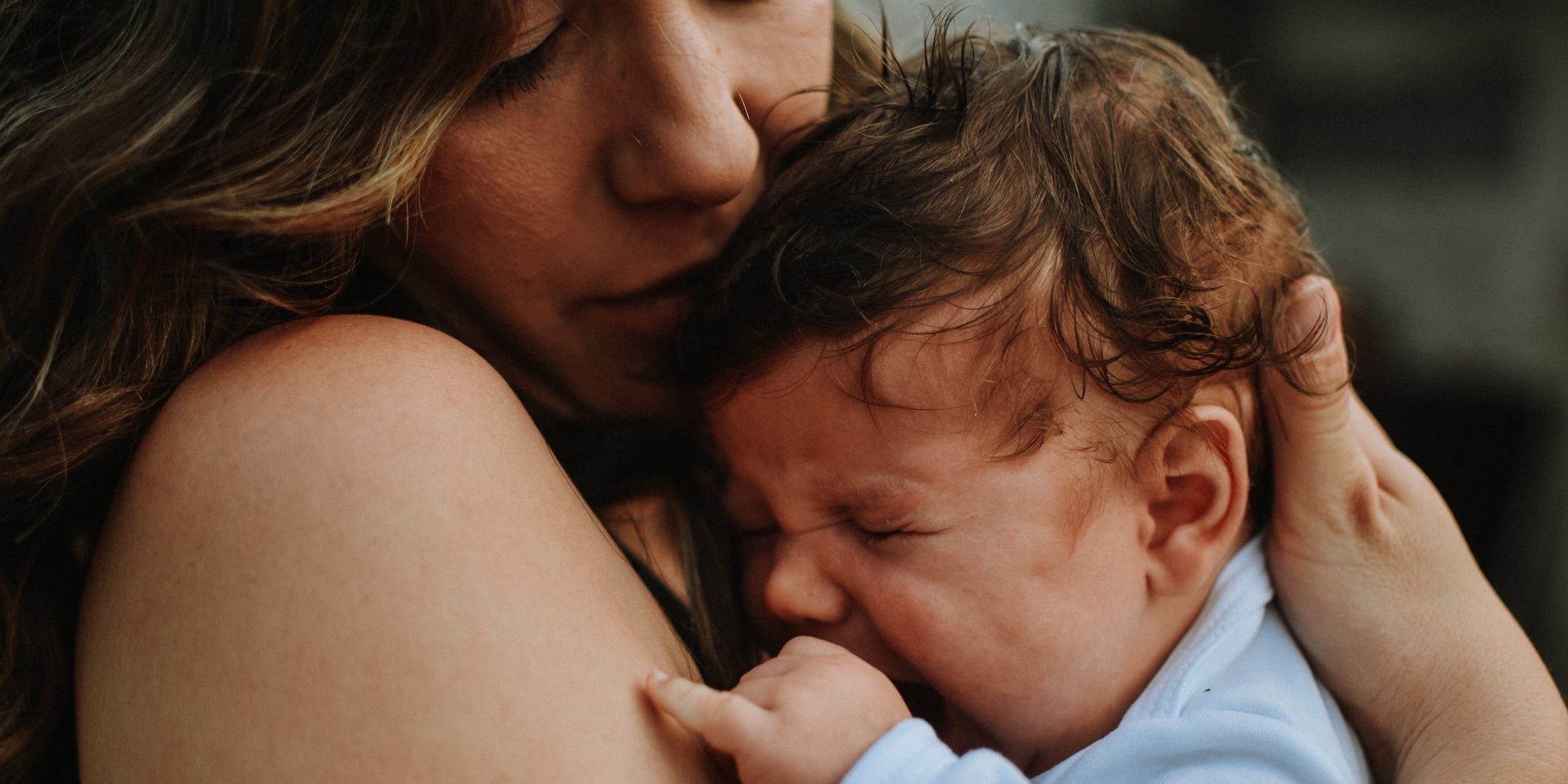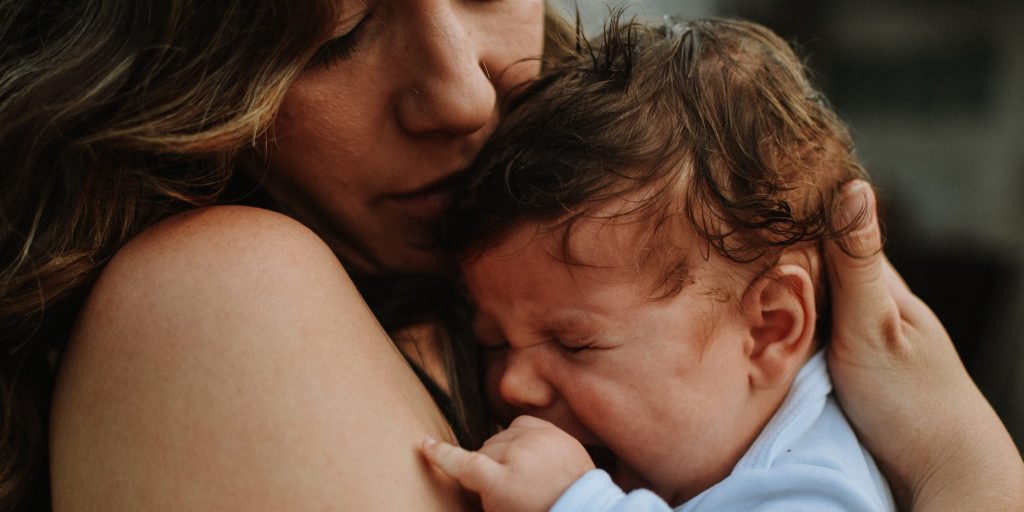
- Postpartum depression can last months or years, but most people recover within six months.
- First-time mothers, young mothers, and mothers of twins have a higher risk of postpartum depression.
- Postpartum depression can afflict biological moms and dads, as well as adoptive parents.
- Visit Insider's Health Reference library for more stories.
If you're like most women, you'll probably experience some form of temporary depression within the first couple of weeks after giving birth. That's because your levels of estrogen and progesterone are dropping quickly, which can trigger mood swings.
This form of mild, short-lived depression is normal. What's not normal is if your depressed mood continues for months, or even years, after birth. This means you likely have a case of postpartum depression, and it should be taken seriously.
Postpartum depression usually lasts 6 months
Postpartum depression can start during pregnancy and last anywhere from a couple of weeks to years after birth. While most people recover from it within the first six months, an estimated 25% to 50% of people experience it for longer.
"Anyone experiencing symptoms longer than two weeks needs to talk to their physician or therapist to assess for postpartum depression," says Kristin Edwards, PhD, Psychology Fellow at Tampa Pediatric Psychology. The causes of postpartum depression are unique for each person. However, there are common risk factors.
According to a 2022 survey of more than 1 million women from 138 countries, a mother's age and number of children affects their risk of developing the condition. For example, mothers, aged 18-24 were more likely to have postpartum depression than people in their 30s.
And mothers of twins reported higher rates of postpartum depression than mothers of single babies across all age groups, but especially among women 40 and older.
Another finding from the survey was that first-time mothers have a higher risk of developing postpartum depression than mothers who have had a prior pregnancy.
Other risk factors for postpartum depression include:
- A history of anxiety and depression
- A history of moderate to severe premenstrual syndrome
- Negative attitude towards pregnancy
- Recent difficult life events
- History of sexual abuse
- Low self-esteem
- Risky pregnancy such as emergency cesarean or hospitalization during pregnancy
- Postpartum complications such as prolapse
- Low infant birth weight of your baby, under 3.3lbs
- Expectations for the birth that did not occur, such as the desire for natural delivery that resulted in a cesarean birth
- History of insomnia or insomnia during pregnancy
Moms and dads can get postpartum depression
Approximately 10% to 15% of new mothers will experience clinical postpartum depression. But it's not just women. Men can experience postpartum depression, too.
Researchers have found that you're 2.5 times more likely to suffer from postpartum depression if your partner is experiencing it. This might help explain why an estimated 4% to 25% of new fathers suffer postpartum depression in the first two months after their child's birth.
Postpartum depression can also affect non-biological parents. A 2011 study reported that 8% of adoptive mothers in the study experienced symptoms of depression compared to 16.5% of biological mothers. The adoptive mothers also reported less anxiety and greater well-being overall.
Symptoms of postpartum depression
Edwards says that common symptoms of postpartum depression include:
- Gloomy mood
- Irritability
- Low self-esteem
- Guilt
- Sleep problems
- Suicidal thoughts
- Fatigue
- Low interest in plans or activities that the mother used to find enjoying
Other symptoms, according to the National Institute of Maternal Health, are:
- Hopelessness, sadness, or feeling overwhelmed or empty
- Socially withdrawing from friends and family
- Lack of emotional attachment or bonding with your baby
- Thoughts of self-harm or of harming your baby
- For a full list of symptoms visit the National Institute of Maternal Health
How to treat postpartum depression
If you're worried that you have postpartum depression, the first and most important step that doctors recommend is to contact your obstetrician or midwife immediately. They can screen you and determine the next steps toward treatment.
"Social support can be a huge protective factor for postpartum depression," says Edwards. "With regard to specific evidence-based psychotherapeutic treatment approaches, cognitive behavioral therapy and interpersonal psychotherapy have the most support."
Cognitive-behavioral therapy is a type of talk therapy that is considered the current gold-standard in psychotherapy for treating depression. It's been proven to help treat all types of depression including postpartum depression.
Breastfeeding has also been shown to help reduce postpartum depression. A 2014 study reported that women who exclusively breastfed their newborns in the first three months after giving birth reported fewer symptoms of depression than women who did not. However, you should not use breastfeeding as a form of self-treatment for postpartum depression.
If therapy doesn't help, consider taking antidepressants. It can take time to find the right type of antidepressant for you. So, if your depression worsens or the side effects last, speak to your doctor about trying another medication.
Insider's takeaway
Postpartum depression can last months or years depending on when you get treatment. Most people recover within six months, but 25% to 50% of new parents may experience the condition for longer.
Though postpartum depression is different for every person affected by it, common risk factors include being a young, first-time mother, being pregnant with twins, having a history of anxiety and depression, or undergoing a risky pregnancy, such as an emergency C-section.
All parents are at some risk of developing postpartum depression, including dads and adoptive parents. Symptoms can include fatigue, lack of interest, irritability, sleep problems, thoughts of self-harm, and more.
If you think you're suffering from postpartum depression, it's important to contact your obstetrician or midwife as soon as possible and start getting treatment. They may suggest cognitive-behavioral therapy or antidepressants to alleviate symptoms.
